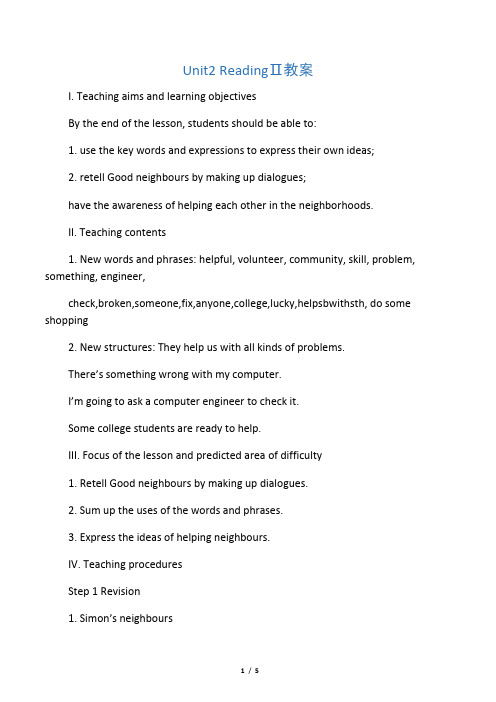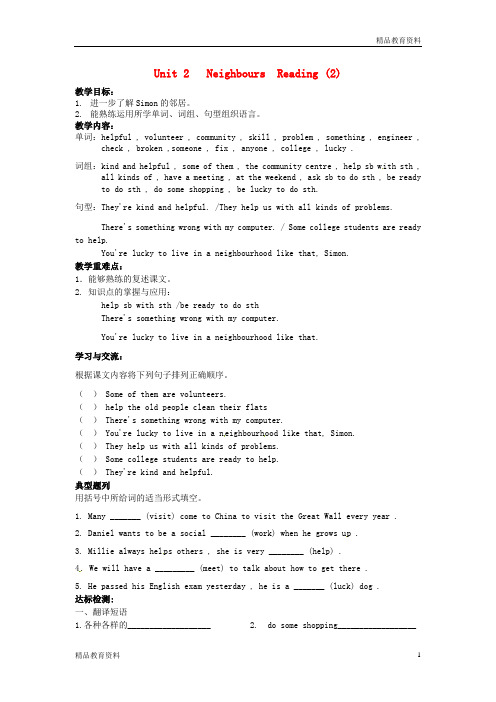最新精编牛津译林版七年级英语下册Unit2 Reading2导学案
- 格式:doc
- 大小:41.00 KB
- 文档页数:3


Unit2 ReadingⅡ教案I. Teaching aims and learning objectivesBy the end of the lesson, students should be able to:1. use the key words and expressions to express their own ideas;2. retell Good neighbours by making up dialogues;have the awareness of helping each other in the neighborhoods.II. Teaching contents1. New words and phrases: helpful, volunteer, community, skill, problem, something, engineer,check,broken,someone,fix,anyone,college,lucky,helpsbwithsth, do some shopping2. New structures: They help us with all kinds of problems.There’s something wrong with my computer.I’m going to ask a computer engineer to check it.Some college students are ready to help.III. Focus of the lesson and predicted area of difficulty1. Retell Good neighbours by making up dialogues.2. Sum up the uses of the words and phrases.3. Express the ideas of helping neighbours.IV. Teaching proceduresStep 1 Revision1. Simon’s neighboursT: Do you still remember Simon’s neighbours?(1) Where do the volunteers often meet?(2) What do they share with each other?(3) What’s Simon’s problem?(4) What’s he going to do?2. Complete the sentences3. Finish the paragraphT: Finish the paragraph with the expressions given.【设计意图:从简单的回答问题,到看图完成句子、短文填空,通过不同的练习帮助学生复习课文内容,使学生迅速进入本课教学,也为接下来的教学做好铺垫。

——Keep pushing——《Unit 2 Neighbours Reading》导学教案一.教学目标1.了解阳光镇的基本情况2.复习和拓展有关生活方式和活动的词汇3.学习掌握课文中出现的语言点4.拓展延伸至现实生活的运用二.教学重点、难点1.课文理解和复述2.语言点的理解三.教学过程1.检查课前自主中学(见学案)2.课堂活动StepⅠ.RevisionAsk students some questions: What do you enjoy doing?Do you enjoy playing badminton?Have you remembered what the teacher enjoys doing?(Ss.: Traveling)StepⅡ. Lead in1.T: This summer, I traveled in Beijing.Show some pictures of BeijingSs: Learn the new words: pollution, building, theatre, underground, souvenir2.Warming upStepⅢ. PresentationTask 1 speed readingT:OK .Today I’ll take you to Sunshine Town for a trip. Sunshine Town is a great new Town. There are lots of things to do there. There’s less air pollution than in other areas of Beijing. There are many tall buildings and you can go any by underground. There are lots of lakes and trees in the country park. There are lots of lakes and trees in the country park. There are lots of lakes and trees in the country park. There are also many theatres here. You can enjoy Beijing Opera.Ask the students to read th e passages quickly and then answer “T” or “F”questions on Page 29C1.Task 2 listeningListen to the tape and translate some useful expressions.Task 3 intensive readingTask 4 practicingDoing some exercise to consolidate the understanding.Finish PartB and C2.Task 5 speakingAsk the students to repeat the passages with their own words. StepⅣHomeworkAsk students to read the context aloud and translate some sentences. 四.知识讲解(见学案)五.课后巩固(见学案)课后反思:——Keep pushing——教师的职务是‘千教万教,教人求真’;学生的职务是‘千学万学,学做真人’。

unit 2 精品教案牛津译林英语七年级下册一、教学内容本节课选自牛津译林英语七年级下册的Unit 2,主要内容包括:2. 详细内容:本单元主要围绕学校场所和设施展开,学习如何介绍学校各个场所的名称和位置,以及如何描述学校的日常活动。
二、教学目标1. 能够听懂、会说、会读、会写与学校场所和设施相关的词汇和句型。
2. 能够运用所学知识,向别人介绍自己的学校。
3. 提高学生的英语口语表达能力和合作学习能力。
三、教学难点与重点1. 教学难点:如何正确使用there be句型和方位词描述学校的场所和设施。
2. 教学重点:掌握与学校场所和设施相关的词汇和句型,并能运用到实际情境中。
四、教具与学具准备1. 教具:PPT、图片、磁带、录音机2. 学具:课本、练习本、彩色笔五、教学过程1. 引入:通过展示一组学校场所的图片,引导学生用英语说出各个场所的名称,激发学生的学习兴趣。
2. 呈现:教师播放教材中的听力材料,让学生跟读,学习there be句型和方位词,引导学生用所学句型描述图片中的学校场所。
3. 实践:学生分小组,根据所给情景,运用所学知识进行角色扮演,向别人介绍自己的学校。
4. 例题讲解:教师针对学生在实践中出现的错误,进行讲解和纠正。
5. 随堂练习:学生完成课后练习,巩固所学知识。
六、板书设计1. 词汇:classroom, library, playground, canteen, there be, in, on, under, near2. 句型: What's in the picture? There is aclassroom/library/playground/canteen.Where is theclassroom/library/playground/canteen? It's in/on/under/near七、作业设计1. 作业题目:根据所学内容,编写一段对话,向别人介绍你的学校。

Unit 2 Neighbours Reading (2)教学目标:1.进一步了解Simon的邻居。
2.能熟练运用所学单词、词组、句型组织语言。
教学内容:单词:helpful , volunteer , community , skill , problem , something , engineer , check , broken ,someone , fix , anyone , college , lucky .词组:kind and helpful , some of them , the community centre , help sb w ith sth , all kinds of , have a meeting , at the weekend , ask sb to do sth , be ready to do sth , do some shopping , be lucky to do sth.句型:They're kind and helpful. /They help us with all kinds of problems.There's something wrong with my computer. / Some college students are ready to help.You're lucky to live in a neighbourhood like that, Simon.教学重难点:1.能够熟练的复述课文。
2. 知识点的掌握与应用:help sb with sth /be ready to do sthThere's something wrong with my computer.You're lucky to live in a neighbourhood like that.学习与交流:根据课文内容将下列句子排列正确顺序。

7B.Unit 2. Neighbours.Reading 2 学案Class Name一、词汇运用。
1.The (问题)is that we cannot find anyone to show us the way.2.What about (检查)all the students’ names?3.The work needs some special (技能),so I’m afraid I can’t do it.4.Why do you go to the hospital?Are you not feeling w these days?5.Her brother who is now a teacher always wants her to go to (大学).6.The (工程师)spend much time and energy on the development(发展)our town.7.A large number of [vɒlənˈtɪə]worked day and night to help fight against the pandemic.(流行病)8.Tom’s new toy car is (break).Can you help him fix it?9.My son is (luck)enough to get the red stars at school.10.Most of (they)spend a lot of time helping the old people.11.His mum always makes him (wash)his clothes.12.My father often (fix)my bike by himself to save money.13.---Is this your umbrella?---No.It’s another (visit).14.We have many different (activity)after school.二、单项选择。
Unit2 Reading导学案【词汇】helpful adj. 愿意帮忙的;有用的*volunteer n.志愿者,义务工作者community n.社区skill n.技能,技巧help . with sth.帮助某人解决某种困难problem n.问题,难题something pron.某事,某物engineer n.工程师;技师check vt.检查broken adj.损坏了的;破碎的someone pron.某人fix vt.修理anyone pron.任何人college n.学院do something shopping 买东西lucky adj.幸运的【学习过程】ReadingA Good neighboursAmy wants to learn more about Simon’s neighbours. Read their conversation.Amy: Hi, Simon. What are your neighbours like ?Simon: They’re kind and helpful. Some of them are volunteers. They often meet at the community centre and share their different skills. They help us with all kinds of problems.Amy: When do they meet?Simon: Usually they have a “ helping hands” meeting at the weekend.Amy: Are they going to have a meeting this weekend ?Simon: Yes. There’s something wrong with my computer. I’m going to ask a computer engineer to check it. My cousin Annie’s bicycle is broken, so she’s going to ask someone to fix it. Amy: Can you find anyone to help you with your homework ?Simon: Yes. Some college students are ready to help.Amy: That’s really nice. Do the volunteers help the old people too ?Simon: Yes. Some of them often visit the old people and do some shopping for them. This weekend, they’ll help the old people clean their flats.Amy: That’s great ! You’re lucky to live in a neighbourh ood like that, Simon.B2. Amy is writing something about Simon’s neighbours. Read her notes. Write a T if a sentence is true or an F if it is false.1. V olunteers share their skills and help people in the neighbourhood with different problems. ____2. Usually there is a meeting at the weekend. ________3. Simon wants to ask someone to fix his bicycle. _________4. Annie’s computer is broken. _________5. Parents help their children with their homework. _________6. V olunteers also help the old people. _________【知识建构】1. They help us with all kinds of problems.【语言点1】help常用结构①help with sth.“在某方面帮助某人/ 帮助某人(解决某种困难)”②help ( to ) do sth.“帮助某人做某事”【典例精选1】I usually ___________________________________________(帮我弟弟学数学). 【拓展】与help相关的短语:help oneself to...随便吃......with the help of sth. / with one’s help在某人的帮助下【典例精选2】①你们随便吃些面包吧。
Reading II新课导入Revision新课讲授Step 1:Complete the Part B3.Step 2:Language points进行对话中的语言点讲解。
1. They are kind and helpful.帮助学生归纳整理动词加后缀构成形容词的单词。
(培养意识)2.They he lp us with all kinds of problems.重点讲解有关help的用法。
3. There is something wrong with my computer.(1)重点讲解there be something wrong with...句型结构(2)介绍此结构的同义句的翻译。
4. She's going to ask someone to fix it.重点讲解ask的用法。
5. Some college students are ready to help.重点讲解be ready to do用法。
Step 3:ExercisesStep 4: HomworkGrammar新课导入Revision Reading新课讲授Step 1: 通过三组图片及问题导入新课。
What are they doing?What will they do?What’s the family doing?What will they do?What is the old woman doing?What will she do?Step 2: A. Simple future tense with will and shall介绍“一般将来时will/shall+动词原形”的含义及各种句式Step 3: Exercises1)P23 —Asking for help2)强化练习Step 4:B. Simple future tense with be going to介绍“be going to do”的将来时的各种句式Step 5:Exercises1)P24 —Planning a day out2)强化练习Step 6: Homework。
英语:Unit2 第2课时Reading学案(译林牛津版七年级下)预学热身l.通过预习,读懂文章,了解阳光镇的基本情况。
2.了解更多有关生活方式和活动的词汇。
3.了解如何写录像的解说词。
4.了解课文的语言点。
预学目标◆预习课文前,请初步了解本课时的词汇并完成以下练习(英汉互译)。
l.less adj. ________ 2.close adj. ________3.life n. ________ 4.________ n.地铁5.________ n.空气;大气6.________ n.污染7.________ n.乡村8.need help with…__________________9.at night __________________ 10.__________________不得不;得11.__________________例如12.__________________去散步◆自主探究,请带着下面这些问题阅读教材。
1. How far is Sunshine Town from the centre of Beijing by underground?2. What can you do in Sunshine Park?3. How many floors do the buildings usually have?4. Are the souvenirs expensive?5. How many restaurants are there in Sunshine Town?教材导读l.Welcome to Sunshine Town欢迎来到阳光镇知识点:welcome to…的用法[指点迷津]welcome to…的意思是“欢迎来到……”,后面常跟表示地点的名词。
Welcome to China.欢迎来到中国。
[提醒] 当地点用副词表示时要省略介词to。
Welcome back!欢迎回来![拓展] welcome to…还可以跟动词,表示“欢迎做某事”。
课题Reading (2) 主备主核
使用者课型New 使用日期
【学习目标】
1.Understand the important languages points.
2.Do some exercises
第一次集体备课(通案)第二次备课(个案)【导入新课】
Revise the names of jobs and places, asking some questions.
e.g. 1.Where do you live?
2.What kind of home do you have?
3.Do you have any neighbours?
【板书课题】
Unit 2 Reading (2)
【学习目标】
1.Understand the important languages
points.
2.Do some exercises
【自学指导】
Step 1.Warm up
1. Revise the names of jobs and places, asking some
questions.
e.g. 1.Where do you live?
2.What kind of home do you have?
3.Do you have any neighbours?
Step 2. Show studying aims
1.Understand the important languages points.
2.Do some exercises
Step 3.Guide One
Read the blogs again and answer the questions
1. What do you think of Simon’s neighbours? Answer the questions in oral.
Encourage them answer the questions in one sentence.
2. What will you do for your neighbours?
Step 4. Guide Two
Languages points:
1.What are your neighbours like?
你邻居怎么样?
be like…“像……”, like此处是介词
2. They help us with all kinds of problems. 他们帮助我们解决各种困难。
help sb with sth 帮助某人某事3. There is something wrong with my
computer. 我的电脑坏了。
There is something wrong with…Something is wrong with…某物有问题Do some exercises then check the answers each other.
Step 6. Homework:
1. Recite the three blogs.
2. Remember the language points in this lesson.
【堂清知识】
1.What are your neighbours like?
你邻居怎么样?
be like…“像……”, like此处是介词2. They help us with all kinds of problems.
他们帮助我们解决各种困难。
help sb with sth 帮助某人某事3. There is something wrong with my computer. 我的电脑坏了。
There is something wrong with…
Something is wrong with…
某物有问题
【当堂检测】
1.我们准备好去散步了
2.一些大学生时刻准备帮助别人。
3.安妮的自行车坏了。
4.他正在安装我的坏自行车。
5. 我的电脑坏了。
Ask the students make notes carefully. And read them aloud.
日清内容
翻译句子:
1. 这男孩看起来很像他爸爸,他非常喜欢游泳。
2. 这位工程师正在修理一辆坏了的汽车。
3. 你的电脑有问题吗?
4. 他常常帮助我学习英语。
5.我们准备好出发了。
第三次备课(反思)
得:通过对知识的复习巩固,绝大多数学生掌握了语言点。
并能用自己的语言来描述自己的家,或梦想的家。
失:对能力强的同学还应创造机会提升能力。
改:分层次布置作业,对能力强的学生布置综合练习题。